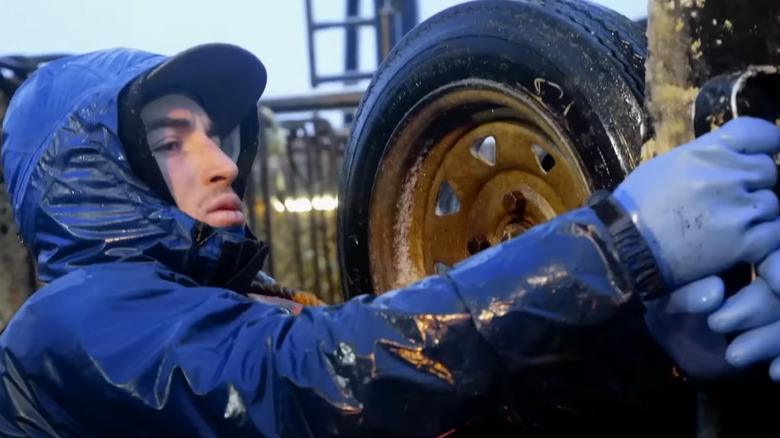The Horrible Carpal Tunnel Deadliest Catch Crew Members Endure That Isn't Shown On TV
The deckhands and crew members on Discovery's "Deadliest Catch" spend each day facing down some of the most harrowing work conditions imaginable. Longtime fans of the series know that commercial fishing itself is one of the most deadly occupations in the United States, with the CDC reporting that commercial fishermen have a fatality rate 29 times higher than the national average.
Indeed, each and every crew member you meet on "Deadliest Catch" is constantly fighting for their life while working on the open ocean — enduring tumultuous weather conditions, hazardous fishing equipment, and the ever-present threat of hypothermia — as they labor day in and day out to pull in as much crab as possible. "Deadliest Catch" makes it abundantly clear that working as a deckhand is one of the most dangerous professions on the planet and one which involves tackling a wide array of obstacles and struggles.
In fact, one of the most damaging complications that a "Deadliest Catch" crew member can endure is never even shown on TV — despite the fact that it can have debilitating effects on their health.
Most crew members develop extreme and debilitating carpal tunnel syndrome on Deadliest Catch
In a 2011 interview with Entertainment Weekly, longtime "Deadliest Catch" star Keith Colburn – captain of the F/V Wizard – revealed that nearly every crew member on "Deadliest Catch" develops carpal tunnel syndrome due to their work with heavy equipment. "These guys work so hard, they all get carpal tunnel syndrome," Colburn said. "They're moving 40-pound objects all day long ... They're clenching all day long, tying knots. And so pretty soon during the course of the season, your fingers start to go numb. Pretty soon it goes into your hands, into your wrists — some guys all the way to the elbows."
Colburn went on to explain that many crew members will wake up each morning to find their hands frozen into "claws," and that they have to use hot water just to get their blood flowing again. Although this might not seem like a major issue due to the other deadly facets of the commercial fishing industry, the long-term effects of carpal tunnel syndrome can be extremely debilitating.
According to the National Institute of Health, severe cases of carpal tunnel syndrome can lead to hand weakness, a wasting away of the muscles in the thumb, and damage to the median nerve that runs along the forearm. Colburn's comments shine a light on the extreme cases of carpal tunnel that plague the crew members on "Deadliest Catch" — a condition that can leave those crew members with debilitating issues long after they've stopped working in the crab-fishing fleet.

